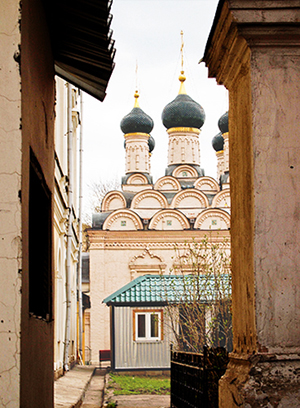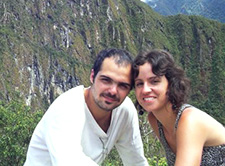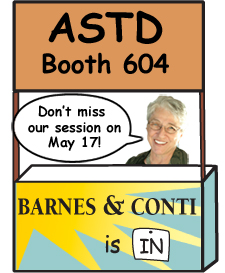Spring 2010
The Situation Is “Normal”
I have been working in Moscow for the past week. The Cisco groups I have worked with have been outstanding, engaged and involved, eager to learn, and willing to question and take risks to gain new skills. That was Thursday. I was heading home on Friday, but that was not to be. Instead, I am enjoying a leisurely work day here in Moscow because, along with tens of thousands of others, I am stranded until the volcano spirit decides it has done enough damage and that we have learned our lessons about overdependence on technology and acknowledged our global connectedness. OK, OK, we get it!
Fortunately for me and many others, we are still able to connect virtually, and it is surprising how much a real voice and face from home means when you are feeling abandoned by your comfortable assumptions about how the world is supposed to work. And of course, I am one of the lucky ones who learned about this while still in the hotel, not in some airport in the middle of a journey. It does make me stop and reflect on what I have come to think of as “normal.”
There was an interesting article in the English-language paper, the Moscow Times, (by Michele Berdy) about how Russians use the word “normal.” It has several meanings, among them:
- regular, as usual (The internet is working normally.)
- not great but not horrible (It’s a normal workday. Same old, same old.)
- appropriate or adequate, usual (It’s normal for engineers to be more introverted than salespeople.)
- nothing special (It’s a normal apartment. Leaky faucets, poor ventilation.)
- as it should be (Moscow is a normal city.)
- adequate, acceptable, better than mine (People are making a normal salary in that company.)
- it will have to do (This is a normal set of instructions. I don’t have time to do any better.)
- ironic meaning: all screwed up—like the American Army’s SNAFU (Working until midnight because someone didn’t do his or her job—that’s normal)
So I would say that a life without a flight is “normal”—in the last sense!
In the twenty-five years since I was last in Moscow, the city has, indeed, become “normal” in the way we use the word in English. Then, there was nothing in the shops unless you saw a line—and everyone got in the line to buy whatever was available so they could trade it for something they actually needed. Now, G.U.M., the main department store, is a gorgeous galleria of high-end shops and cafes, bustling with busy people enhancing their lives with Guerlaine perfume, Rolex watches, and Apple computers.
Then, men dressed in ill-fitting clothes, babushkas (grandmothers) turned a watchful eye on hotel guests to make sure they were where they ought to be, and women swept the streets with awkward brooms. Now, the men look young and well turned out, wearing beautiful Italian suits. The women are impossibly thin and gorgeous, wearing stilettos that would be at home in a weapons museum.
Then, tourists were herded about by a stern Intourist guide. One of our group was stopped by the police for buying something on the street. Today, hordes of them from all over the world sweep through Red Square and the Kremlin, cameras at the ready, as delightedly disorganized as they want to be, shopping and dining as they wish.
Then, Pepsi had just been introduced. Now, American-based fast-food restaurants are a stone’s throw from the Kremlin. Then, churches were being imploded and replaced by museums of heroic accomplishments by soldiers, farmers, and Soviet bureaucrats. Now, the churches have been rebuilt and refurbished and there is a palpable, emotional sense of religious fervor. Then, the tanks and other military equipment on show were bristling with menace. Now, the one tank I saw had a bouquet of flowers on it. Then, the Kremlin seemed a mysterious and forbidding place. Now, it’s a tourist destination not so different from the Capitol building and the Congressional offices in Washington, D.C.—except that it includes Cathedral Square. The city looks beautiful and bustling and prosperous. Brides and grooms abound, it’s spring in Moscow.
I hope that by the time you read this, I will be back in the States. After we lost our home in the Oakland fire of 1991, I swore that I would not take things for granted any longer—but of course, I do. Yet now our freedom to move about the planet has been interrupted by Mother Nature. I hope you are where you want to be—I will appreciate that experience more than ever before—if and when my life, and the lives of so many others, becomes “normal” once more.
Part 2: The Real Moscow
The real Moscow rides the Metro. Young, old, poor, and middle-class, cheek to jowl. I did not spot any of the oligarchs. For that matter, one difference between the Moscow Metro and the London Tube or NY subway, Boston’s MTA, the Metro in Paris or San Francisco’s BART is that people tend to either read or sleep, as used to be true on those conveyances. Very few people wear earphones—one young man was holding a portable CD player, one was using an iPhone—but most people were just busy not making eye contact. Of course, cell phones are ubiquitous here as everywhere and useful for that purpose...
Part 2 continues on the Barnes & Conti Blog
—B. Kim Barnes
In this Newsletter
- Barnes & Conti’s Consulting Exchange Internship with Global Partner in Chile
- Barnes & Conti at ASTD: Visit Us at Booth 604
- Barnes & Conti Partners with Cornell University’s ILR School
- Managing Innovation in Mexico through New Global Partner
- Cisco and Western & Southern Life: Training Magazine’s Top 125 Companies
- Featured Recipe: Borsch
- Just for Fun
- Featured Art (above): “Church Behind the Bureaucracy” photo by Kim Barnes
 Barnes & Conti’s Consulting Exchange
Internship with Global Partner in Chile
Barnes & Conti’s Consulting Exchange
Internship with Global Partner in Chile
Kim Barnes’ work with CDO Consulting Group, our global partner in Santiago, Chile brought about a month-long internship for one of our Chilean partners. Rodrigo Joglar (pictured at right with his wife, Maria de Luz), an organizational psychologist and a consultant with CDO, spent the month of March, 2010 as an intern at our Berkeley office.We asked Rodrigo to write about himself and the internship; below is what Rodrigo said:
My name is Rodrigo Joglar. I am an organizational psychologist and a consultant with CDO Consulting Group, a pioneer company with more than 30 years of experience in organizational development and training in Chile. CDO is Barnes & Conti’s global partner in Chile.
At this point in my life, I am spending a month in Oakland, California... Why? Well, in 2009, Kim Barnes came to visit us in Chile. She brought with her the Exercising Influence program, and worked with our consultants to apply the program in Chile. That same visit presented a tremendous opportunity to share experiences and visions about OD, Training, and how we could continually improve ourselves in the disciplines that we teach and offer to our costumers.
That time of reflection spawned an internship between CDO and Barnes & Conti; a professional development opportunity where one consultant from Chile could spend one month in the San Francisco Bay Area, serving as part of the local team of Barnes & Conti. In this internship, we could examine their best practices, learn about their specialties, join their day-to-day operations and their regular routines. The goals and dynamics of this internship would be to find new paths for developing innovation. Our company in Chile could learn skills to create value from diverse, new, and original ideas, which is one of CDO’s principal organizational goals.
This whole process has become a reality just last week. I have been here since this past Saturday, and the experience has already been very powerful and rich. So far, I can confirm the importance of developing innovation in organizations in a simple but deep way. The innovation management process always meets resistance, but it also needs and generates creativity, respect, commitment, efficient execution and leadership. The innovation process of Barnes & Conti clarifies—step by step—every part of the path we need to travel in order to succeed in our innovation process, from its beginning—in the ideas creation —until the successful execution of a new project.
I have three weeks to keep on learning as well as giving of my own consulting experience to Barnes & Conti in whichever ways I can. I hope that this can be only the first of other exchange experiences. Projects, such as this internship, are great opportunities to build bridges and relationships in a world that demands new connections and a global vision of business.
Barnes & Conti at ASTD: Visit Us at Booth 604
 Barnes & Conti is pleased to participate in the ASTD
2010 International Conference and Exposition in Chicago, Illinois,
May 16-19. Barnes & Conti President and CEO Kim Barnes will be part
of a panel discussion with five other senior practitioners/consultants/business
owners. The topic for discussion is entitled: “Building
a Practice: Pondering the Past, Predicting the Future.” From
the session description:
Barnes & Conti is pleased to participate in the ASTD
2010 International Conference and Exposition in Chicago, Illinois,
May 16-19. Barnes & Conti President and CEO Kim Barnes will be part
of a panel discussion with five other senior practitioners/consultants/business
owners. The topic for discussion is entitled: “Building
a Practice: Pondering the Past, Predicting the Future.” From
the session description:
...In this dynamic, interactive session, you’ll explore what it takes to be successful with clients, celebrate the chance to be a business owner, and ponder what matters most professionally and personally. Join this unconventional conversation as five energetic business owners discuss what it takes to stay in business for decades...
The session will be on May 17th
4:00-5:30 pm in
M310.
Special Offer: Free Expo Passes to ASTD Conference
To visit the Expo as a guest of Barnes & Conti visit the Comp Expo Only registration site and enter invitation number 511.
Barnes & Conti Partners with Cornell University’s ILR School
Barnes & Conti and Cornell University’s School of Industrial and Labor Relations have co-developed a one-day workshop offered through Cornell University. The program is entitled, Building a Strategic Partnership with Line Leaders. Two successful workshops have already been conducted this year and an additional public session is scheduled for December.
In this program, participants analyze line leader discussions as they reveal business challenges and seek advice. They respond in real time to a series of questions, probes, challenges, and confrontations that cover the range of traditional responses to HR. Lastly, they recognize line leader “hot buttons,” and practice discussions that will get line leaders’ attention and demonstrate their ability to be a strategic partner. Models from our Exercising Influence program are shared as tools with participants.
Key topics include:
- Developing your own “narrative,” rationale and case for a seat at the table
- Recognizing typical HR responses that create a negative bias
- Increasing your confidence by having a wider range of responses in difficult exchanges
- Learning tips and techniques for demonstrating rapid responses to business situations
- Positioning yourself as a strategic partner
The program is especially designed for HR leaders who routinely consult to line leaders. The program is co-taught by Barnes & Conti Senior Associate Joanna Russo and another senior human resources professional. The cost per person is $995. One more public workshop is scheduled this year for December 13th, 2010 in New York City. You can register on Cornell’s web site and be sure to enter “BARNCON” in the mailing label box. If mailing or faxing the registration form, you must include “BARNCON” in the mailing label box as well.
Also, please contact Lauren Powers, lpowers@barnesconti.com or 215-232-1611 if you would like to schedule this exciting program onsite for your HR professionals.
 Managing Innovation in Mexico through New Global Partner
Managing Innovation in Mexico through New Global Partner
Our popular Managing Innovation™ program recently debuted in Mexico, through the auspices of our new Mexican partner, Deconsulting. Thanks to Deconsulting and our own Kim Barnes, Managing Innovation has been in the news in Mexico. Here is an excerpt from the February 23 edition of the newspaper Empresas in Reforma (translated from Spanish, of course):
Innovation is a vital issue for companies and economies of the world... Within this environment the course, Managing Innovation, was recently conducted for the first time in Mexico. Managing Innovation was developed by the North American consulting firm, Barnes & Conti, in association with the Centre for Research In Innovation Management at the University of Brighton (in the U.K.).
“The course is a way to develop the needs and opportunities for strategic innovations and competitiveness with more order, speed and improved performance. It also deals with the skills, attitudes and competencies the drivers of innovation need on a personal and professional level, and it is for all types of organizations,” stated Kim Barnes, President and CEO of Barnes & Conti.
Read more about Deconsulting and Managing Innovation on our website.
Cisco Systems and Western & Southern Life:
Training
Magazine’s Top
125 Companies
We were delighted to find that a couple of client companies that Barnes & Conti is proud to serve were listed among Training Magazine’s Top 125 companies for training and development. Training lists the following as criteria for the award:
- Training tied to business objectives
- Employee turnover and retention
- Leadership development
- Evaluation procedures
- Training budget as percentage of payroll
- Overall business results.
Our congratulations to Cisco and Western & Southern Life on their outstanding achievement. Not coincidentally, Western & Southern Life sent us a press announcement, which we were more than happy to quote on our blog.
 Featured
Recipe: Borsch
Featured
Recipe: Borsch
Since our lead article was on Russia—and it’s author was served borsch every day while stranded in Moscow, we offer this recipe. Please note that in Russia, they don’t pronounce the final “t”; hence what we call “borscht” they call “borsch.” The tomato isn't really authentic (except in a purely cabbage borsch without beets), but it adds a pleasant acidity. We offer it in two versions; the long version involves making a broth and is best done on a rainy weekend afternoon. Even the short version needs advance planning, however, the beets can be roasted a day or so ahead of time.
Ingredients, Long Version:
- 2+ lbs brisket of beef
- 1 onion, sliced
- 1 carrot, sliced
- celery leaves (optional)
- 1 bay leaf
- 3-4 cloves
Short Version:
- 2 lbs beef stew meat cut in 1 inch chunks
Both Versions:
- 6+ cups water
- 1-2 tsp salt
- 5-6 medium to large red beets
- 1 medium onion, chopped
- 2 carrots, peeled and chopped
- Oil for sauteing
- 1/2 head green cabbage, cored and shredded (I like to use Savoy cabbage, but plain green cabbage is more authentic)
- 1/3 - 1/2 large can tomatoes, chopped
- lemon juice or wine vinegar (optional)
- chopped scallions
- chopped dill
- boiled potatoes (optional)
- Sour cream
Method, Long Version:
- Make a broth by bringing the brisket, sliced onion, sliced carrot, celery leaves, bay leaf, cloves, and salt to a boil in a soup pot. Skim the broth, and lower to gentle simmer. Simmer, covered for 1.5 - 2 hours.
- While the beef is simmering, roast the beets at about 400 degrees until they are tender (at least 1 hour). For best results, roast unpeeled with an inch of their stalks left. Roast the bunch of them wrapped in foil.
- Remove the brisket from the broth and allow to cool. Strain the broth and reserve it. Discard the onion, carrot, celery leaves, bay leaf, and cloves.
- When the brisket is cool enough to handle, cut into 1 inch or bite sized pieces.
Short Version:
- Do step number 2, above.
Both Versions:
- In a heavy soup pot, saute the chopped onion and carrot in the oil over medium heat until the vegetables begin to caramelize (light brown).
- Add the shredded cabbage, and stir in the hot oil for 2-3 minutes. Add the tomatoes.
- (Long version only) Add the broth from the brisket and the cut up brisket
- (Short version only) Add the 5 cups water and 1-2 tsp. of salt and the cut up beef stew meat.
- Bring to a boil. While you're bringing it to a boil, peel and shred or coarsely grate the beets and add to the borsch.
- Simmer the borsch for at least an hour, until the cabbage is well cooked and the beef is very tender.
- Taste at this point; you may need to add salt and lemon juice or vinegar. Borsch should be pleasantly sour.If the borsch is too thick, add water. It should be a very thick soup.
- Serve with chopped dill and/or chopped scallions and lots of sour cream. Boiled potatoes can be served along side and added to the borsch (for some reason they are rarely cooked with the borsch).
With good rye bread and a salad, this is a very full meal for 4-6 people.
Just for Fun: From the Moscow Times
A front-page story in the paper discussed the “blue bucket” problem. Russian officials and oligarchs have flashing blue lights on the top of their cars (called migalki) which allow them to ignore stop lights and other traffic signals —obviously they are too important to be slowed down—while everyone else sits in traffic for hours. Some disgruntled Russian drivers have taken to upending small blue buckets and attaching them to the top of their cars.
The police at first tried to arrest the drivers, but the arrests were overturned in court. However, Alexei Dozorov, the engineer who started this low-key Russian protest movement, carries a court ruling in his car in case he is stopped (by the police) and says with a smile, “There is no law that prohibits someone from carrying a bucket on the roof.”
Miss the newsletter? Stay in touch with B&C more often through our blog.
Please send feedback to newslettr1
at barnesconti.com
Barnes & Conti, 940 Dwight Way Suite 15, Berkeley, CA 94710,
USA
Copyright © 2010 Barnes & Conti Associates, Inc. ALL RIGHTS
RESERVED.
